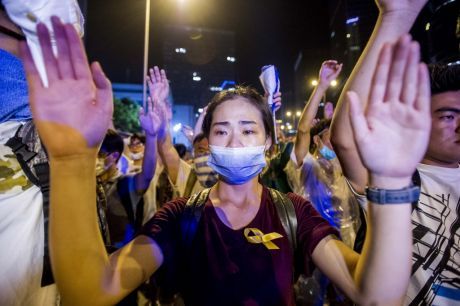Features
You are here
Hong Kong protests: pro-democracy means anti-capitalist

October 25, 2014
Protests in Hong Kong began in September demanding greater democracy. But rather than simple demands for Western-style democracy, as they’ve been portrayed in the West, the strikes and protests are intertwining with social and economic demands.
In 1997 Britain gave Hong Kong back to China, and since then the state capitalist regime has promised but not delivered democracy. When the Standing Committee of the National People’s Congress (NPCSC) of China proposed that nomination of candidates for Chief Executive (head of government) be vetted by at least half of a 1200-member committee representing Hong Kong business interests, protests exploded.
Strikes and occupations
The Hong Kong Federation of Students organized a strike that drew thousands and then occupied the central square. Police responded with tear gas but this failed to stop the protests and instead drew more people into the street and international solidarity. Spearheaded by student groups and Occupy Central (financial district), the protests grew to a broad-based, mass-movement and continued through October, becoming known as the Umbrella Movement for the umbrellas used to shield tear gas.
Student and Occupy groups have played important organizing roles, and there are grassroots initiatives where people pass a microphone around in equal turns to share thoughts on the situation. After the tear gas attack the Hong Kong Confederation of Trade Unions called for a strike. As the crowds reached 200,000 people on the streets, they stuck to core demands of free elections, resignation of Chief Executive CY Leung, and resignation of the Police Chief.
State and free market capitalism
While Western media have described these events in vague pro-democracy language, Beijing state media hurled conspiratorial accusations of western provocation (similar to the Ukraine-Russia tensions). These simplifications distract from core issues, which are inconvenient to the elite on either side—issues of inequality and poverty amid opulence. Commentary has played down the fact that the latest protests are largely a continuation of Occupy Central actions, part of the global movement focused on economic inequality and corporate greed.
These earlier Occupy protests drew the condemnation of global financial interests. Hong Kong branches of the big four accounting firms (PwC, Deloitte, KPMG and EY) issued a joint statement saying the city’s financial industry could be harmed; HSBC downgraded the city’s economic projections; Chambers of Commerce of Hong Kong, Italy, Canada and India also voiced their opposition; as did Hong Kong’s most prominent billionaire tycoons and property speculators. CY Leung said poor people shouldn't be allowed to vote, because "If it's entirely a numbers game—numeric representation—then obviously you'd be talking to half the people in Hong Kong (that) earn less than US$1800 a month. You would end up wotih that king of politics and policies."
The complex economic relationship between the U.S. and China mean both sides have mutual benefit in downplaying the protests. Stable dictatorships have long been the preferred form of government for Anglo-imperial capitalism, and China is likely no different. When police first used tear gas on protesters, the U.S. Consulate declared they will “not take sides in the discussion of Hong Kong’s political development.” Among the U.S. and allies, criticism of CCP corruption and authoritarianism has muted as trade and investment have increased. Due to Chinese interest in Canada’s tar-sands and natural resources, this is perhaps even more the case with Harper than David Cameron or the Obama Administration. As long as China is banker and sweatshop for the West, moderation and stability will be the watchwords directed to Beijing.
Methods to deal with Occupy Central in Hong Kong have been little different than those employed against protestors in New York or Toronto. Despite pro-democracy platitudes, politicians and corporations are too busy doing business with Beijing to genuinely care about these movements, and we should not let them claim otherwise.
Anti-capitalism
The anti-capitalist antecedents of the Umbrella Movement reveal opposition to both Chinese state capitalism and Western free market capitalism—both of which are undemocratic and controlled by billionaires. Anti-capitalist groups maintain support and organizing roles within the movement, and are advocating democratic reform as a first step to real change, while also emphasising that even with free elections the fight against capitalist oppression in Hong Kong would continue.
According to Sophia Chan, an activist from the Hong Kong socialist organization Left 21, “In this democratic movement, we have been trying to push the economic and labour side…As for our demands, we see free elections as a major blow to business-government collusion and capitalist privilege, because currently half of the seats in the parliament of Hong Kong (‘Legislative Council’) reserved for ‘functional constituencies, which basically mean that certain economic sectors (such as finance) in Hong Kong are guaranteed a seat in the parliament. When we fight for policies such as the minimum wage or a standard labour law, it is almost always those members of parliament who block the bill. Also, the electoral committee for the Chief Executive election as proposed by Beijing would consist of 1,200 representatives, almost all of whom belong to business sectors such as real estate, banking, etc. Beijing has explicitly declared that this is to protect the interests of capitalists. As such, although we do think that a democratic political system is only the first step to real change, we also think that that in itself would already be a huge improvement for our fight against capitalist oppression in Hong Kong. Of course, we do also try to spread the idea that even if we obtain free elections, we would still battle against tycoons and capitalists.”
Section:










